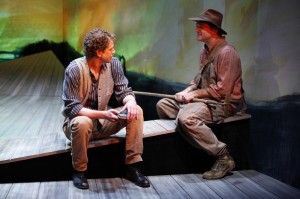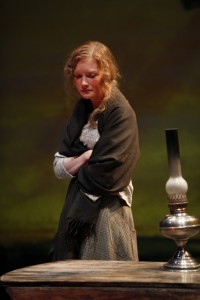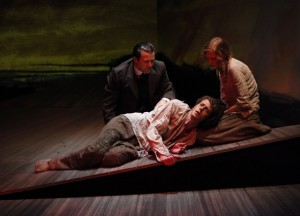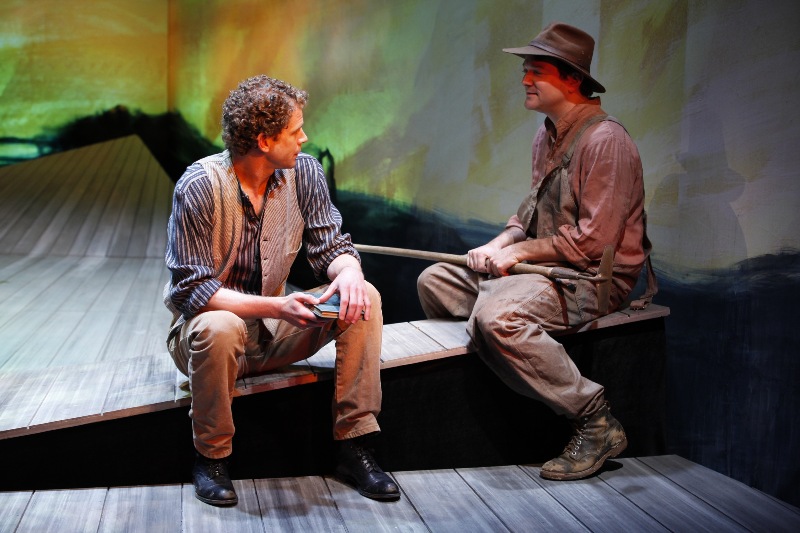
Lucas Hall (Robert Mayo) and Rod Brogan (Andrew Mayo) in Eugene O'Neill's BEYOND THE HORIZON at Irish Repertory Theatre (132 West 22nd Street), directed by Ciaran O'Reilly. (Photo credit: Carol Rosegg). For more information, visit http://www.irishrep.org
At the close of BEYOND THE HORIZON’s second scene, after domestic strife has erupted, seemingly tearing the Mayo family asunder for good, Andy, ever the practical optimist, reassures his brother Rob that “Everything’ll turn out all right in the end.”
This is a character who does not know his playwright.
Eugene O’Neill had little taste for happy endings, and less for redemption. His is a theatrical world of suffering and consequence, of poor decisions and their disastrous ramifications, of the original sin of having been so audacious to have ever been born in the first place. Heavily influenced by the philosophy of Friedrich Nietzsche and the drama of August Strindberg, O’Neill left us an oeuvre teeming with the powerful sorrow of characters for whom he showed little compassion. Perhaps the greatest misstep an O’Neillian character could make is to try embracing and fostering any sense of normative domesticity. For this, O’Neill subjected his characters to great punishment.
All these themes are on full display in the Irish Repertory Theatre’s production of O’Neill’s first full-length play, BEYOND THE HORIZON. This is a play of misery and suffering, and director Ciarán O’Reilly wisely embraces those subjects, never shying from the pain permeating this play. The result is a heavy evening of theater that eschews things like uplift and redemption entirely. An insightful and faithful production, this show eagerly seizes the anguish O’Neill’s play offers it, and envelops itself in the harsh reality that whatever may or may not lie beyond the horizon is certainly not a panacea for the woe of the here and now.

Wrenn Schmidt (Ruth Atkins) in Eugene O'Neill's BEYOND THE HORIZON at Irish Repertory Theatre (132 West 22nd Street), directed by Ciaran O'Reilly. (Photo credit: Carol Rosegg). For more information, visit http://www.irishrep.org
BEYOND THE HORIZON’s Rob Mayo is a young lover of poetry, beauty, and wonder, in a salt-of-the-earth family of farmers. He has always been out of place on the farm, and is now set on leaving with his sailor uncle for a three-year sea voyage. Rob’s only brother is Andy who, as much more of the traditional Mayo man, works the farm and looks after Rob while gently teasing him for his wandering mind. The fraternal bond is strong here: as different as the brothers are, they remain very affectionate. But that bond is tested almost immediately. Ruth, the young woman who lives on the neighboring farm, has always been loosely involved with Andy, but when Rob confesses his love while saying goodbye, Ruth joyously returns the sentiment.
Newfound love inspires Rob to back out of his sea voyage, and the shock of losing Ruth to his brother spurs Andy to take Rob’s place on the ship. Enraged at Andy for abandoning the farm, the Mayo patriarch James furiously bids him never to return, as Rob—untrained and unskilled at farming—vows to start doing his share around the farm. Yet, with Andy’s absence and James’s abrupt death, Rob’s inexperience is exposed, and while the Mayo family farm deteriorates under his leadership, we watch as the stress threatens to destroy both the love that seemed so pure in the first scene, and the family living in the aftermath of hasty decisions dictated by emotion.
That stress is visited most directly on Rob and Ruth, quickly married and newly responsible for the upkeep of the farm and the family, and both performers are impressive in their gradual physical and psychological deterioration. From the very beginning, Lucas Hall’s Rob is a romantic and a dreamer, fundamental characteristics which Mr. Hall captures in both the wistfulness of his voice and the regular fleetingness of his gaze that suggests a wandering mind in Rob. As this character crumbles physically and psychologically, Mr. Hall does well to find the touch of the poet that remains in his character, however fleeting.
Wrenn Schmidt as Ruth has the unenviable task of playing O’Neill’s principle woman, the sort of character for whom the playwright seems to have had the most scorn, but she nicely embodies all Ruth’s faults and fully bears all her psychological trauma. Ms. Schmidt vividly shows us Ruth’s journey from girlish playfulness in the opening scene, through bitterness and frustration, to psychological and emotional resignation. The romantic notions of the world that persist in Rob quickly abandon Ruth, and Ms. Schmidt’s performance makes vivid the regret and anger that come to define this character.

. (clockwise) Rod Brogan (Andrew Mayo), Wrenn Schmidt (Ruth Atkins), Lucas Hall (Robert Mayo, pictured laying down) in Eugene O'Neill's BEYOND THE HORIZON at Irish Repertory Theatre (132 West 22nd Street), directed by Ciaran O'Reilly. (Photo credit: Carol Rosegg). For more information, visit http://www.irishrep.org
The Irish Rep’s move this season from Brian Friel’s DANCING AT LUGHNASA to O’Neill’s BEYOND THE HORIZON is a bold juxtaposition from Friel’s late-career bittersweet portrayal of the loss of innocence to O’Neill’s earliest full-length presentation of the themes that would come to define so much of his work. The theater’s transition between these plays underscores what is unique and special about BEYOND THE HORIZON: in it we see the antecedents of characters like Lavinia Mannon and Edmund Tyrone, and we hear the first sounding of O’Neill’s bewilderment with the human condition that will echo in late masterpieces like THE ICEMAN COMETH. The Irish Rep has thus made an admirably provocative choice to move from one master’s late reflection to another master’s early exploration.
In exploring his most familiar themes, O’Neill crafted BEYOND THE HORIZON into a tragedy of the future tense. Its characters are overcome with the salvation that may very well be around the next bend, all while being swallowed by the suffering of their present. Its first scene is one of love and emotional decisions; the rest is an exploration of the consequence of such things. In this production, Mr. O’Reilly shows the courage to stick with O’Neill as he takes his characters over and beyond increasingly painful horizons. That line in KING LEAR about things not being the worst as long as we can say “this is the worst” rings painfully true for this play, and The Irish Rep’s production fearlessly embraces this exploration of pure sorrow in the present tense.
BEYOND THE HORIZON
Written by Eugene O’Neill
Directed by Ciarán O’Reilly
February 15 –April 8, 2012
The Irish Repertory Theatre
132 West 22nd Street
New York, NY, 10011
212-727-2737
http://www.irishrep.org/


